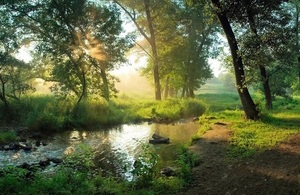
Lower than average rainfall, continuing through April and May - particularly in the East of England - has seen some river flows decline to lower than normal for the time of year. In the south and east, rainfall has not replenished groundwater stores, with levels now declining. While there is no threat to public water supply, these conditions are putting particular pressure on the environment and agriculture.
Farmers in East Anglia, Lincolnshire and Northamptonshire have reported they are facing significant pressures with irrigation. Environment Agency monitoring has shown a decline in water available so there were discussions about how the water companies and the Environment Agency can help farmers during the growing season, particularly in the east of England.
Environment Agency Chief Executive, Sir James Bevan met with government departments, the Met Office, National Farmers Union (NFU) and water company CEOs to agree the action needed to support farmers and wildlife as well as conserve water supplies if the dry weather persists.
The NFU urged farmers to consider how they could be affected by running out of water and to make plans, where possible, to manage water shortages. The EA set out a number of steps it has taken to support farmers including:
- Allowing farmers to flex abstraction licence conditions to take more water, wherever this can be done without damaging the environment, in order to safeguard food production and animal welfare. So far in 2019, the EA has approved 90% of requests.
- Extending the licence trading map from East Anglia to Lincolnshire, Northamptonshire, East Midlands and West Midlands, to help abstractors look for opportunities to access other abstractors' unused water
- Working with the NFU, CLA and AHDB to hold advice sessions for farmers since January 2019.
Following the meeting, Environment Agency Chief Executive Sir James Bevan said:
Ahead of the summer months, the National Drought Group met to agree action to reduce the risk of drought measures and damage to the environment.
Some rivers and groundwater supplies are below average so the Environment Agency is ready to respond to incidents over the summer and we are supporting farmers where possible by flexing water abstraction licences and with water trading. We welcome action the water companies are taking to ensure maintenance of supply over the coming months.
The water that comes from the tap is taken from rivers and reservoirs and the amount we use has direct effect on wildlife, the environment and agriculture. The National Drought Group collectively asks industry and the public to use water wisely.
A full position statement from the NDG is available on gov.uk.
Despite reservoir storage decreasing during May, public water supplies are looking more stable. Reservoir stocks for public water supply are just below average for the time of year. During the meeting, water companies also set out the action they are taking to maintain water supply over the coming months, including:
- taking action to find and reduce leaks.
- making water transfers around their networks and between companies to meet demand and rest some sources.
- ensuring that all potential sites are application-ready for drought permits.
- working with farmers locally to identify ways to sustain and share water supplies
During last year's heatwave, the environment suffered the driest May to July across England since 1921 and it was the joint hottest summer on record. The Environment Agency reported a 330% increase in environmental incidents related to the dry weather as teams acted to protect wildlife and rescue fish struggling due to low river flows.
At today's NDG meeting the group heard that there is growing concern over the potential impacts of prolonged dry weather on the environment and the cumulative effect from last year. Environmental incidents such as wildfires, algal blooms and fish rescues have already been reported comparatively early for the time of year.
The EA has taken proactive action to protect wildlife and the environment including:
- operating compensatory pumping schemes to support low river flows, such as the Slea augmentation scheme in Lincolnshire.
- installing aerators on the Ouse washes to enhance oxygen levels to protect fish, and by loaning aerators and dissolved oxygen meters to angling clubs and fisheries across East Anglia.
- continuing enforcement activity to ensure abstractors comply with their licences to help minimise the impact on the environment.
In his "Jaws of Death" speech Sir James Bevan recently called for more discussion about water use and a concerted effort to explain to the public that wasting clean tap water has an impact on the environment.
With the climate emergency and population growth and we will have hotter and drier summers in the UK. There will be more extreme weather events, with decreases in summer rainfall and increases in winter rainfall. That will mean more water shortages and a higher risk of more frequent and more extreme droughts.
The National Drought Group members renewed their commitment to collaborate on actions to address this long term challenge and explain the need for reducing water use.






